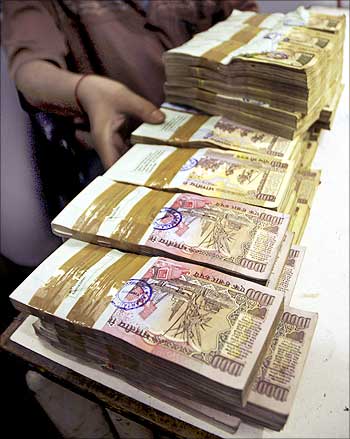A stream of people, including those from Rajasthan and Karnataka, walked into the only designated office before the closure of the one-time compliance window.
 The Centre's efforts to unearth unaccounted money stashed abroad seems to have got a tepid response, with the declarations made under the three-month compliance window that ended on Wednesday turning out to be much lower than expected.
The Centre's efforts to unearth unaccounted money stashed abroad seems to have got a tepid response, with the declarations made under the three-month compliance window that ended on Wednesday turning out to be much lower than expected.
The government ruled out an extension of the one-time relief window, saying it was not a measure to raise revenues but an opportunity for people with undeclared money to avoid prosecution under the unaccounted money legislation.
According to official sources, as of Wednesday evening, declarations of only about Rs 3,000 crore had been made during the three-month window.
However, more disclosures might have come by the end of the day, given that these could also be made online.
According to news agency PTI, there was a rush on Wednesday to declare assets in New Delhi. A stream of people, including those from Rajasthan and Karnataka, walked into the only designated office before the closure of the one-time compliance window.
"A huge number of declarations are expected to be made through the official e-filing website of the I-T department," PTI quoted an official as saying.
"We are not concerned about the response. The government did not stake its reputation on the compliance window at any stage. We made it clear it was not a revenue-raising measure like the voluntary disclosure scheme of 1997. It was an opportunity for people. From now we will start acting and prosecuting; they should not say a retrospective act has come in," said a government official in the know.
In fact, the government had collected far more money - close to Rs 10,000 crore (Rs 100 billion) - under its Voluntary Disclosure Scheme of 1997 to declare source of income.
This time, as part of its electoral promise to get back unaccounted money stashed abroad, the government had enforced the Black Money (Undisclosed Foreign Income and Assets) and Imposition of Tax Act, 2015, with stringent punitive provisions for evaders.
A small staff of the designated I-T Commissioner was seen helping the declarants put their documents in order after which they were called for due formalities and given an official acknowledgement under the seal of the department, according to the PTI report.
"The entire process takes about 10-15 minutes for a person. By and large people who are coming have filed Form 6, which has been notified for this three-month special-window period under the new anti-Black Money Act," said a chartered accountant.
Those who failed to make disclosures under the window might face a tax and penalty amounting to 120 per cent of the total value of the undisclosed asset, and an imprisonment of up to 10 years. By comparison, those who disclosed unaccounted income and assets till September 30 will be required to pay only 30 per cent tax on the value of the asset and an additional 30 per cent penalty over that.
Some tax consultants suggested the government could allow declarations to be made till December, which is also the payment window.
Rejecting such speculations, though, the official quoted earlier said: "Whatever had to be disclosed needed to be done by September 30. And payments had to be made by December 31.
Tax consultants pointed out that there was no incentive for people to disclose black money abroad, given that foreign banks and financial institutions did not keep data older than 10 years.
While the official agreed with that, he added it was a conscious risk taken by entities. "That is a risk they are consciously taking. Yes, it is true that most banks and financial institutions do not keep track for more than 10 years; we are aware of that. But they run a risk; if something comes to our notice, they will face the stringent law as we have tax-exchange treaties with most countries now," he said.
Instead, entities are focusing on cleaning up accounts with international offshore tax evasion and black money detection pacts, such as the Indo-US Foreign Account Tax Compliance Act (Fatca) and the Automatic Exchange of Information (AEOI). Fatca came into force from September 30.
Tax consultants pointed out that businesses and individuals hardly approached them over the black money Act disclosures, suggesting they did not care much.
"Banks and financial institutions do not keep data for more than 10 years. Instead, people are more concerned about Fatca and AEOI," said a consultant.
To address assessees' concerns over the black money Act and the compliance window, the Central Board of Direct Taxes (CBDT) had issued two sets of 'frequently asked questions' allaying concerns related to confidentiality.
CBDT warned that a failure to declare an undisclosed foreign asset might also result in forfeiture of assets under the Prevention of Money Laundering Act.
TEPID RESPONSE?
- A 3-month compliance window for people to disclose their assets ended on Wednesday
- Declarations in the window were much lower than expectations
- An extension of the window has been ruled out
- Those who failed to disclose might face tax and penalty amounting 120% of the total value of the undisclosed asset
- Those who disclosed unaccounted income and assets abroad will be required to pay 30% tax on the value of the asset and an additional 30% penalty










 © 2025
© 2025